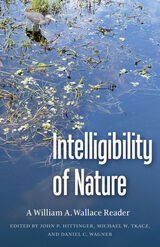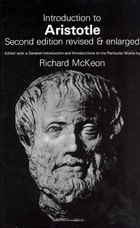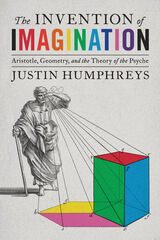106 books about Aristotle and 3
start with I
106 books about Aristotle and 3
106 books about Aristotle
3 start with I start with I
3 start with I start with I

Intelligibility of Nature
A William A. Wallace Reader
William A. Wallace
Catholic University of America Press, 2022
The intelligibility of nature was a persistent theme of William A. Wallace, OP, one of the most prolific Catholic scholars of the late twentieth century. This Reader aims to make available a representative selection of his work in the history of science, natural philosophy, and theology illustrating his defense and development of this central theme. Wallace is among the most important Galileo scholars of the past fifty years and a key figure in the recent revival of scientific realism. Further, his long and productive scholarly career has been shaped by a continuous effort to bring the resources of the Aristotelian-Thomistic tradition to the solution of contemporary problems of philosophy and science. Through all of these contributions, Wallace has provided the foundation for a renewed confidence in the capacity of human knowers to attain understanding of the natural order. Consequently, the overall aim of this volume is to secure continued access to his scholarship for readers in the new millennium.
The Intelligibility of Nature will contain twenty-nine previously published essays written by Wallace over a period of some forty years. Many of these essays are currently not readily accessible. They are arranged in five thematic groups, each representing a major subject-area of Wallace's scholarly interests. The first group is devoted to essays on making nature intelligible through the use of scientific models. The second group of essays investigates various ways in which the Aristotelian-Thomistic tradition is foundational to contemporary scientific research. Essays in the third group are historical studies on the origins of modern science. The fourth group of essays discuss the viability of the cosmological argument for the existence of God in light of natural science. The final group of essays consider the relation of science and religion. Together these essays provide a representative sample of Wallace's multifaceted contributions to scholarship.
[more]

Introduction to Aristotle
Second Edition, Revised and Enlarged
Aristotle
University of Chicago Press, 1974
Since the publication of the original edition in 1947, Richard McKeon's Introduction to Aristotle has become the standard text for a variety of courses in philosophy and the humanities. For this revised and enlarged edition, Professor McKeon has completely rewritten his General Introduction and his introductions to the particular works. He has also expanded the collection to include material from On the Parts of Animals and the Rhetoric.
Aristotle's contribution to Western civilization is enormous. Our language, our distinctions, our ways of thinking, all are profoundly affected by his work. Since an understanding of Aristotle is indispensable for the understanding of our own culture, the ready availability of his work is crucial.
This collection, for students and general readers alike, provides in one volume Posterior Analytics (Logic), De Anima (On the Soul), Nicomachean Ethics, and Poetics, complete and unabridged, together with generous selections from Physics, On the Parts of Animals, Metaphysics, Politics, and Rhetoric. These works, together with Professor McKeon's revised introductions, provide a convenient and thorough exposure to the works of Aristotle and to the structural interrelations in the Aristotelian system of thought.
Aristotle's contribution to Western civilization is enormous. Our language, our distinctions, our ways of thinking, all are profoundly affected by his work. Since an understanding of Aristotle is indispensable for the understanding of our own culture, the ready availability of his work is crucial.
This collection, for students and general readers alike, provides in one volume Posterior Analytics (Logic), De Anima (On the Soul), Nicomachean Ethics, and Poetics, complete and unabridged, together with generous selections from Physics, On the Parts of Animals, Metaphysics, Politics, and Rhetoric. These works, together with Professor McKeon's revised introductions, provide a convenient and thorough exposure to the works of Aristotle and to the structural interrelations in the Aristotelian system of thought.
[more]

The Invention of Imagination
Aristotle, Geometry and the Theory of the Psyche
Justin Humphreys
University of Pittsburgh Press, 2023
A Provocative Examination of the Origin of Imagination
Aristotle was the first philosopher to divide the imagination—what he called phantasia—from other parts of the psyche, placing it between perception and intellect. A mathematician and philosopher of mathematical sciences, Aristotle was puzzled by the problem of geometrical cognition—which depends on the ability to “produce” and “see” a multitude of immaterial objects—and so he introduced the category of internal appearances produced by a new part of the psyche, the imagination. As Justin Humphreys argues, Aristotle developed his theory of imagination in part to explain certain functions of reason with a psychological rather than metaphysical framework. Investigating the background of this conceptual development, The Invention of Imagination reveals how imagery was introduced into systematic psychology in fifth-century Athens and ultimately made mathematical science possible. It offers new insights about major philosophers in the Greek tradition and significant events in the emergence of ancient mathematics while offering space for a critical reflection on how we understand ourselves as thinking beings.[more]
READERS
Browse our collection.
PUBLISHERS
See BiblioVault's publisher services.
STUDENT SERVICES
Files for college accessibility offices.
UChicago Accessibility Resources
home | accessibility | search | about | contact us
BiblioVault ® 2001 - 2024
The University of Chicago Press









